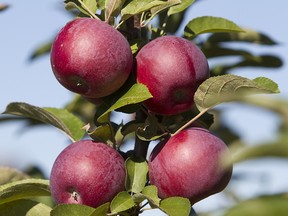The report finds that multi-crop agriculture could benefit from climate change in the form of a longer growing season.

.
While climate change may cause harm to Quebec’s agricultural industry, it may also bring some benefits, and those within the industry who recognize they need to adapt will benefit the most, a report on climate change in the province concludes.
Announcement 2
.
The Quebec chapter of “Canada in a Climate of Change: Regional Perspectives,” a report by the uranos research group, has 127 pages and is described as the “state of knowledge” on the impacts of climate change in the province.
The report finds that multi-crop agriculture could benefit from climate change in the form of a longer growing season, particularly for soybeans and corn, two staples of Quebec agriculture. Those crops could also grow further north as temperatures rise, according to the report.
The same projection applies to growing apples. Apple farms are confined to southern Quebec, but could spread to “regions with new climatic viticultural potential, such as the southern Outaouais and the St. Lawrence Valley.”
Announcement 3
.
The report says such changes could “favor Quebec’s competitive position for these same agricultural products.”
On the other hand, some other crops (canola, barley, and wheat) that are better adapted to cooler climates could be affected by warmer temperatures.
Winter mortality of perennial crops, those that do not depend on the seasons and can remain productive for many years, could be increased by warmer autumns, as well as by frequent thaws and rains during the course of winter. The Ouranos report cites alfalfa and orchard grass, which are used to feed livestock, as examples.
Climate change could also favor the spread of certain crop diseases, weeds and invasive alien species, such as roundworms or soybean cysts, which were first detected in Quebec in 2013. The researchers project that increasing pressure from invasive species could lead to increased use of pesticides and its consequent effects on the environment and human health.
Announcement 4
.
The obvious downsides of climate change have already been seen in the yields of certain crops. Potato and hay harvests were below average between 2017 and 2018 in the Bas-St-Laurent region due to prolonged droughts.
The report finds that water shortages could become more frequent and affect the nutritional quality of crops. Dry spells could also be detrimental to livestock such as cattle, pigs and chickens, affecting livestock weight gain, milk and egg production, and the welfare of the animals themselves.
-
Killer Heat: Hotter, deadlier summers brew in Montreal’s future
-
Allison Hanes: The climate crisis is here. What are we doing about it?




